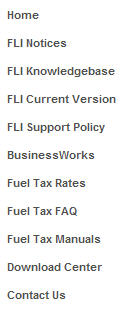|

| |
If
you have received unsolicited commercial bulk email or "Spam"from
FLISupport.com...
FLI does not send spam or mass emails.
Unfortunately, domain names and email addresses
can be forged (spoofed),
and used without consent, permission, or approval from the owner. What these
scam artists are
doing is wrong, and we do NOT condone it.
FLI does not send out any email except that which is
directly related to our business. All of our email is to our clients,
interested prospects that have contacted us, or individuals seeking
information from us.
Again, we are very sorry for any inconvenience if
you received an email pretending to come from flisupport.com. We appreciate your
understanding that, like you, we are a victim of these malicious
perpetrators. FLI is committed to protecting our internet
identity, and will assist law enforcement to identify and convict those
responsible for their illegal misrepresentations.
The safest way to handle spam is:
 |
DO NOT CLICK
LINKS IN SUSPICOUS EMAILS. They may inject
viruses, worms, or trojan programs that can jeopardize your
computer.
Furthermore, most spam are created like a web page, which, upon
being opened, allows the spammers to be alerted, thereby
verifying your valid email address. To
prevent this, disable downloading images in your email settings. |
 |
PERMANENTLY DELETE
emails you know to be Spam, Phishing, or Junk. If from someone
you might know, contact them via phone to confirm they sent it.
Do not reply to the email or use contact information within the
email. |
 |
NEVER open an attachment from anyone -
even friends or family - unless you were expecting it. Email
attachments may inject malicious software
into your computer. If it is an unexpected attachment sent
by a friend, family member, or acquaintance, phone them to confirm before you open it. |
 |
NEVER reply or click on an
"opt-out" link in a spam. You will only alert the
spammer that you have a valid email address, and likely increase
the amount of Spam emails you receive. |
The true senders of spam are often difficult to ascertain. To start,
you must look at the spam's email header information, which can be seen by
viewing the Properties of the email. (Again, do not open the email - just
choose to view the properties.) Reading the email header information is
somewhat difficult due to the arcane language of the internet contained in
it. If you wish to decipher the email header information, learn more about
spam, or take action against the true perpetrators of the spam, please
visit:
To make the internet a safer, more fun place, practice these good-email
tips:
 |
Compose and send ALL of your email
formatted as plain text. "Rich Text" formatting is email
written in HTML, the underlying language of web pages. While HTML
email can be more like a Word document, it can also contain
viruses, and is larger in file size than plain text, creating
congestion on the internet and downloading more slowly over
dial-up modems. |
 |
Don't use false or forged email
addresses. |
 |
Don't flame, i.e., ream someone out
with profanity (unless you find a real spammer, then give it to
them). |
 |
Use email attachments sparingly. If
you are sending pictures over the internet make sure they are
small in file size like a website picture. Good rules for
formatting pictures are to save them at 72 to 150 dpi, use the
JPEG format for photos and the GIF format for simple graphics, and
keep the longest side's dimension at under 800 pixels - the
smaller the better. For other attachments use only Adobe's Acrobat
PDF file format or, again, plain text. Never use any Microsoft
Office® file format (Word®,
Excel®, PowerPoint®,
etc.) unless the recipient has been alerted and is waiting for it;
they can contain dangerous viruses, worms, or trojans. |
 |
Install and run anti-virus and
anti-spyware
software programs, and turn on the auto-update feature. |
 |
Apply updates and security fixes
soon after they are released to your PC's critical software, like the operating system, email,
web browser, anti-spyware, or anti-virus software programs. Use a
firewall program to block your PC's presence on the internet.
Discontinue using unsupported software. |
|
